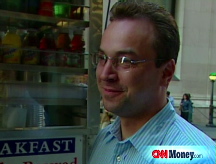Stocks higher around the world
Overseas markets respond positively to British bank bailout and coordinated action by European governments.
NEW YORK (CNNMoney.com) -- Stock markets around the world on Monday jumped higher after governments took a series of aggressive steps to address the global financial crisis.
Stocks in Europe were trading up and key markets in Asia closed higher.
"It looks like we're going to have a nice relief rally today," said David Buik with BGC Partners in London.
Investors were reacting to several government actions:
- The British government announced a $63 billion investment in three major banks.
- The U.S. Federal Reserve, Bank of England, European Central Bank and the Swiss National Bank revealed coordinated steps to juice short-term funding markets. Bank of Japan said it will mull similar measures.
- On Sunday, 15 European nations agreed to a wide-ranging plan to shore up troubled banks.
On Monday, London's FTSE 100 was up 4.9%. The Cac 40 in Paris had gained 6.9% and the Dax in Frankfurt, Germany, was up 8.0%.
In Asia and the Pacific, most markets on Monday posted gains - some were strong.
Hong Kong's Hang Seng stock index rallied to close up 10.2%. South Korea's Kospi index finished 3.8% higher. The Shanghai Composite gained 3.7%. The Taiwan Weighted finished down 2.2%. In Indonesia, the Jakarta Composite was flat.
Stocks in Australia closed the day 5% higher. Markets in Japan were closed on Monday.
U.S. stocks surged Monday morning, following the worst week on Wall Street in history. In early trading, the Dow Jones industrial average jumped as much as 400 points, or 4.8%, with bank stocks leading the way.
U.S. bond markets will be closed Monday for the Columbus Day holiday but stock markets will be open.
And at 8 a.m. ET Monday, Neel Kashkari, appointed last week to oversee the United States' $700 billion bailout program and the newly created Office of Financial Stability, make his first public speech.
Kashkari, a former executive at Goldman Sachs, outlined the government's multi-prong effort to bail out the U.S. financial system and resuscitate the economy, though he offered few details on how the plan will be carried out.
Kirby Daley, senior strategist with the Newedge Group in Hong Kong, said earlier in the day that investors were reacting positively to the news but remained cautious. "Policymakers around the world are going to target the heart of the credit crisis problem. However, more time is needed to get the implementation right," he said.
The scope of the U.S. bailout has changed dramatically since passage little more than a week ago. Initially, the centerpiece of the plan focused on the government buying distressed debt - mostly tied to risky mortgages - from troubled banks.
With the bad paper off banks' books, the hope was that institutions would start lending again - credit markets have been under severe strain in recent weeks as banks have hoarded cash.
But credit markets have remained tight and the U.S. government is now expected to try other measures, such as making direct equity investments into banks.
On Friday, the Dow ended its worst week ever and capped a staggering eight-session selloff that has seen the blue-chip index fall 2,400 points, or 22%.
Investors late last week were demanding coordinated action to stem the credit crisis. Finance officials and central bankers have started to strike more boldly.
Shortly before stocks started trading Monday, the British Treasury said it will pump $63 billion into the Royal Bank of Scotland, HBOS and Lloyds TSB.
"The overall aim of these measures is to support stability in the financial system; to protect ordinary savers, depositors, businesses and borrowers; and to safeguard the interests of the taxpayer," a statement from the British Treasury said.
A fourth bank, Barclays, said it will forgo the government program and will raise $11 billion on its own by selling new shares of preferred stock.
The British move, which had been telegraphed in advance, followed an emergency meeting in Paris on Sunday at which the leaders of 15 European nations agreed to a wide-ranging plan to shore up troubled banks by adding capital through investment and by guaranteeing inter-bank lending.
The nations also said they would protect individual depositors' accounts and move to ease accounting regulations that determine how assets are valued, removing a requirement that they be based on market prices - so-called "mark-to-market" accounting.
The German government assembled a rescue package worth as much as $671 billion and French President Nicolas Sarkozy said his government will provide up to $491 billion, the Associated Press reported.
- Additional reporting by Eunice Yoon, CNN Asia business editor. The CNN Wires reports were used in compiling the article. ![]()


